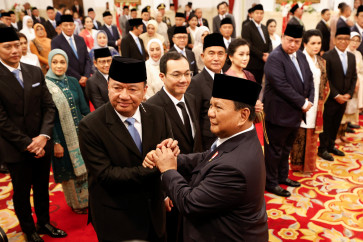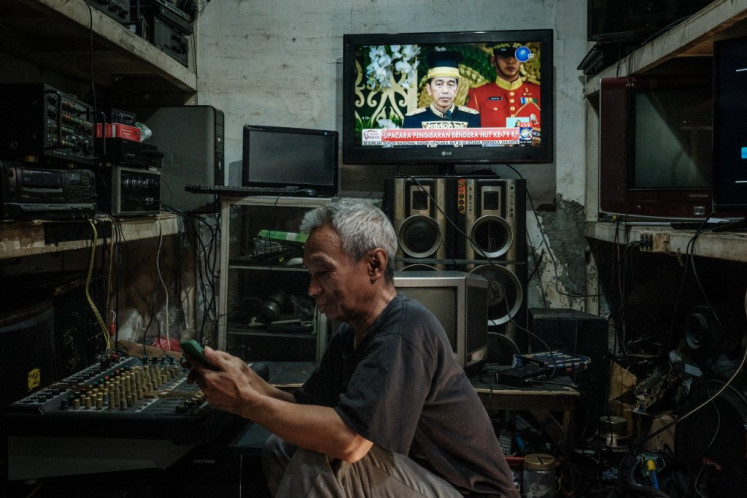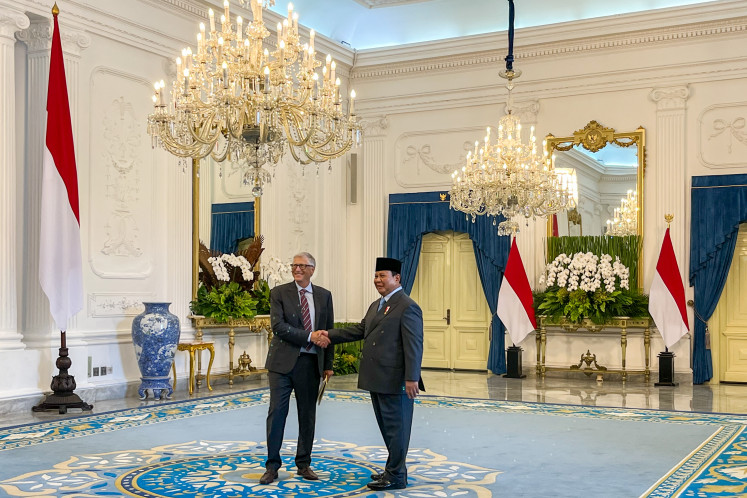Ahmad Fuadi: Freedom in writing
(Courtesy of Ahmad Fuadi)Best-selling writer Ahmad Fuadi never imagined being a novelist
Change text size
Gift Premium Articles
to Anyone
 (Courtesy of Ahmad Fuadi) (Courtesy of Ahmad Fuadi)
(Courtesy of Ahmad Fuadi) (Courtesy of Ahmad Fuadi)
(Courtesy of Ahmad Fuadi)
Best-selling writer Ahmad Fuadi never imagined being a novelist. He said he rarely enjoyed reading novels when he was growing up, but the former journalist and communications officer knew how to write. He also had a story to tell.
Fuadi, from the shores of Lake Maninjau, West Sumatra, said he liked to tell his story of growing up in the Islamic boarding school Pondok Modern Gontor in Ponorogo, East Java to his wife, Danya 'Yayi' Dewanti.
For him, pesantren (Islamic boarding school) life was 'a thing of the past that's nice to remember'. But for Yayi, who grew up in Jakarta, the stories were amazing. She encouraged him to write a novel inspired by his pesantren experience and bought him a book on novel writing.
That was in 2007, when Fuadi was holding a position as communications director of an international environment organization. By that time, his life experiences had brought him far from Maninjau and Ponorogo and he had traveled to some of the world's major capital cities.
A Fulbright Scholarship took him to Washington, D.C. and a Chevening Scholarship to London. He sieved through his journal from school and the letters he sent to his mother from boarding school and started to write.
By 2009, his first semi-biographical novel of the trilogy Negeri 5 Menara (Land of 5 Towers) was released. The book told the story of Alif, who half-heartedly enrolled in an Islamic boarding school under his mother's wishes. He grew to love the school as he found friendship and the wisdom of hard work from his teachers.
The book was nominated for the Khatulistiwa Literary Award and received the Indonesian Readers' Award in 2010. The book has been translated into English and was adapted into a film last year. Fuadi released the second book of his trilogy - Ranah 3 Warna (The Scope of 3 Colors) and the last Rantau 1 Muara (Travel to 1 Shore) in 2013.
Through all the writing process, Yayi has been his personal editor, making notes after he finishes each chapter. 'If there could have been two authors on the cover, the other one would've been her,' he said of his wife.
From the release of his first book up until now, Fuadi said his life had changed with his shift to writing. 'I was an employee in an office, a very convenient job actually. But working for other people is not always what we want. Writing is a new page in my life. I can work in line with my passion,' he said.
Fuadi said writing was special in the way it touched people. 'Reading a book is a private experience. Compared to conversing with someone, where one's attention can wander, reading a book is an experience where the reader must follow the story from start to finish,' he said. 'To be able to touch people on that level is amazing,' he said.
'It has opened a new page for me in terms of self-expression. I feel that [writing] gives more [to the public]. Students can be inspired and be more spirited in reaching their dreams. To be able to touch peoples' lives that way. That's priceless,' he said.
For Fuadi, who defines himself as a writer/novelist, public speaker and social entrepreneur, writing is a tool for a bigger goal.
'I'm curious about fulfilling the advice of my teacher in terms of how to be of use. My uncle was of use by establishing an Islamic boarding school with 3,000 students. What can I do? I can write,' he said.
Fuadi said he wanted to inspire people through his story. He gave permission for the book to be adapted into a film because he wanted more people ' those who didn't necessarily read novels ' to be exposed to the story. Million Pictures produced the film with Salman Aristo as producer and Affandi Abdul Rachman as director.
'At first, I was worried what the [content] of the book would turn into,' Fuadi said of his reaction to the filming of his book. The producers told him the film would only be an adaptation of the book. 'We can't compare it apple to apple. It would be a totally new work of art,' he said.
Fuadi said he was thinking of agreeing to the books to be adapted into a TV series. At the moment, he's working on adapting the stories into comic books.
He has also worked on other projects. With the publisher Bentang, he produced the Man Jadda Wajada book series, from the Arabic saying: 'Whoever persists will succeed'.
'I've written three stories and there are 15 more of people telling of their experiences in practicing the concept of man jadda wajada. It's about how people can break through the boundaries of their own limitations,' he said.
Following the success of his book, Fuadi established Komunitas Menara, a foundation that aims to provide access for early schooling to children from poor families.
'My hope is that Komunitas Menara can be a social movement providing pre-school education. I hope to establish 1,000 pre-schools in Indonesia,' he said.
'That's my goal beyond writing. How I can make myself be more useful,' he said.









